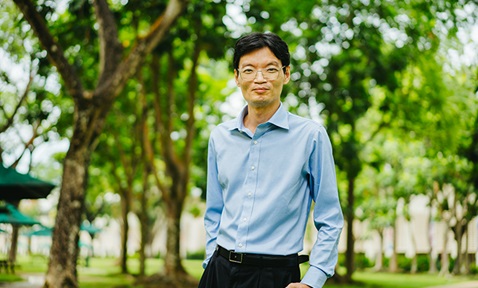Pre-schools prepare children to use technology and tools confidently
SINGAPORE - Some may find the idea of teaching pre-schoolers about cyber security absurd. After all, six-year-olds do not have bank or e-mail accounts.
Yet, these are concepts that NTUC First Campus is introducing to children through hour-long lessons on digital literacy conducted once every two weeks.
The pre-school operator started these classes in June for its Kindergarten 1 and 2 children across all 20 Little Skool-House centres.
At the Little Skool-House branch at Ulu Pandan Community Club, senior English language teacher Eileen Chia, 31, teaches the children about data privacy and cyber-bullying prevention through storybooks like Troll Stinks by author Jeanne Willis.
The pre-schoolers read the story of how two goats steal a farmer’s mobile phone and send mean messages to a troll’s number. They later realise they have hurt the feelings of a baby troll who had read the texts.
When prompted, the children suggested that people should protect their mobile phones with fingerprint passcodes and not send hurtful messages in the name of fun.
The children also worked in pairs to search for posters on cyber security, discussing what search terms to use so that they can find posters with kid-friendly language.
Ms Coreen Soh, 48, general manager of Little Skool-House and chief child development officer at NTUC First Campus, told The Straits Times that the aim is not so much to teach children how to use digital tools, but to educate them on potential dangers online and how to use technology responsibly.
Keagen Tan, six, said he now understands the importance of keeping passwords safe to prevent the misuse of mobile phones.
His father, Mr Tan Chee Hau, 41, a civil servant, said: “It’s inevitable that children are exposed to the Internet, online websites and apps from a young age, so it’s better that they know about the safety aspects than to have to explore them on their own.”
Associate Professor Loh Chin Ee, deputy head of research for English language and literature at the National Institute of Education (NIE), said that given the pervasiveness of digital devices and ease of access to online resources, children should be introduced to concepts of digital health and well-being at an early age.
“Concepts such as personal privacy, managing screen time, and searching for and evaluating online sources are some concepts that young children can engage with in a meaningful way,” she said.
Since the Covid-19 pandemic, there has been a considerable shift towards digital learning in primary and secondary schools, with more lessons being conducted via the Singapore Student Learning Space, the Ministry of Education’s online learning portal.
Likewise, pre-schools have developed their own programmes to prepare children for online learning.
At some of Star Learners’ 43 pre-schools, where children focus on a book and its themes for each term, digital apps and tools are used to help K2 children develop thinking and reasoning skills through related hands-on activities.
Miss Alysha Mohd Sani, 20, an English language educator at Star Learners Child Care at Choa Chu Kang Sports Centre, conducted a lesson where K2 children had to work in groups to make “moon rocks” out of baking soda, water and glitter.
They used iPads to take pictures of what they were doing and to record spoken answers to questions.
The centre’s principal, Ms Siti Yasmira Johan, said lessons like this expose children to some simple digital skills.
Some pre-schools use coding and artificial intelligence (AI) tools to help in language learning. At Toa Payoh Methodist Preschool, K2 children use robots to learn the Chinese language.
There is the Luka AI Reading Robot, which reads aloud bilingual picture books, and the Tale-Bot Coding Robot, which lets children learn new Chinese words while playing navigation games in pairs.
Hanna Lee Chye Yue, six, said these tools make lessons interesting, and the robots’ voice command functions help to improve her pronunciation of Chinese words.
“Luka will first say the words in English, and then in (Mandarin). So I learn new words and get to hear how to say them correctly. Then I will repeat them,” she said.
Dr Sun He, assistant centre director at NIE’s Centre for Research in Child Development, said findings from an NIE-administered e-book reading project showed that using well-designed digital materials promotes early bilingualism.
But she added that as young children spend more time on screens, it becomes crucial to gain a deeper insight into the effects of screen exposure during early childhood.
While the American Academy of Paediatrics advocates that pre-schoolers aged two to five should be restricted to one hour of high-quality digital media exposure a day, reports from various regions indicate that children frequently exceed this recommended limit, Dr Sun said. She added that in Singapore, only 26.5 per cent of pre-school children were observed to adhere to the guideline.
Skool4Kidz’s 28 pre-schools also use coding robots like Bee-Bot during outdoor play. For example, in the school garden, children can program Bee-Bot to move on a grid mat on the ground to “collect” pictures of plants. They can also use a tablet to scan QR codes paired with each plant to get more information about it.
Dr Jane Ching-Kwan, 62, curriculum founder at Skool4Kidz, said its centres use technology tools and resources that are appropriate, purposeful, and have an element of play.
“How can they use these tools to communicate, collaborate and play with their friends, instead of just them and the technology in a singular relationship?” she said, adding that children need to see that learning can happen in different ways.
Read the original article here.
Source: The Straits Times © SPH Media Limited. Permission required for reproduction





.tmb-listing.jpg?Culture=en&sfvrsn=13b00373_1)

.tmb-listing.jpg?Culture=en&sfvrsn=15e6d6d7_1)